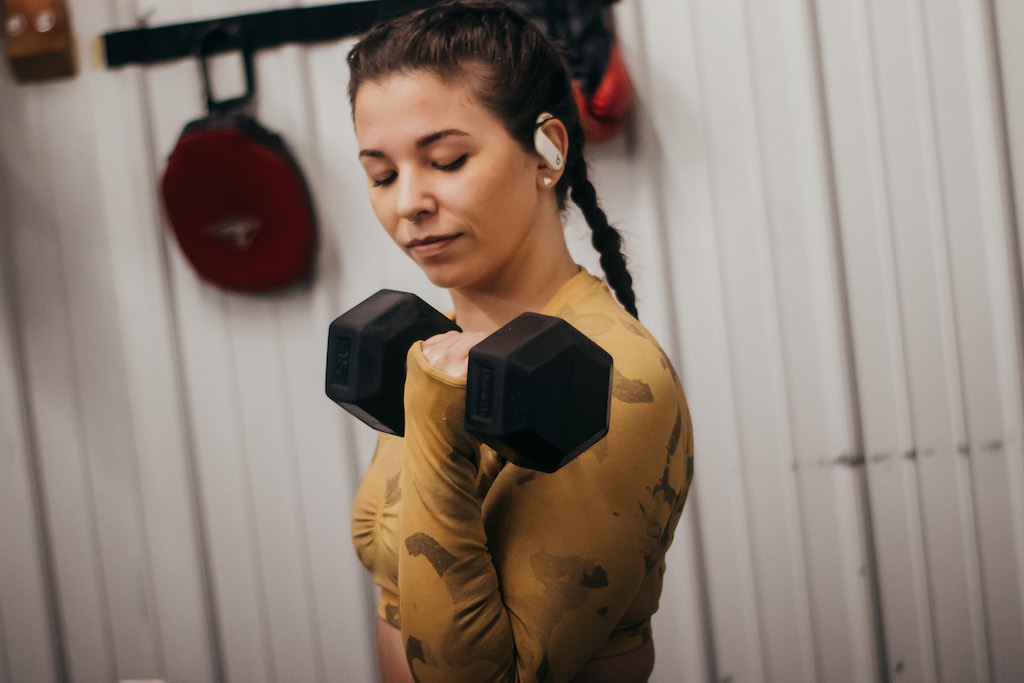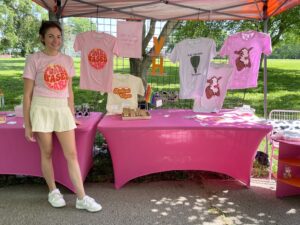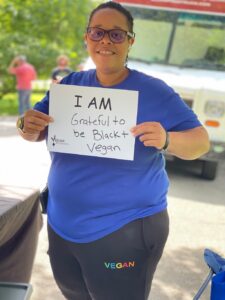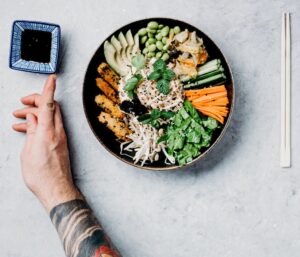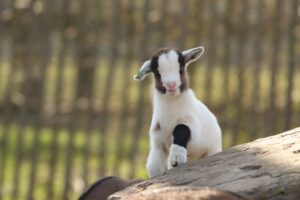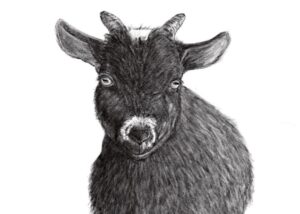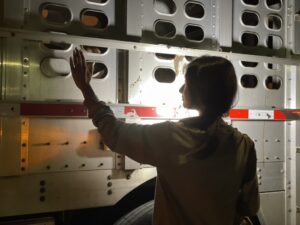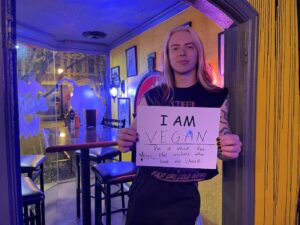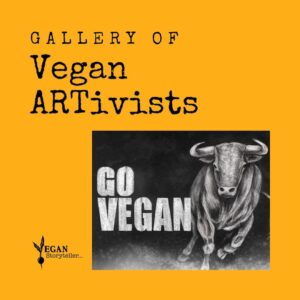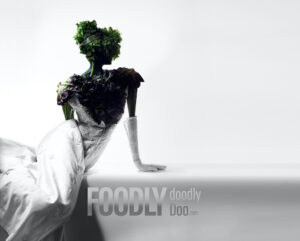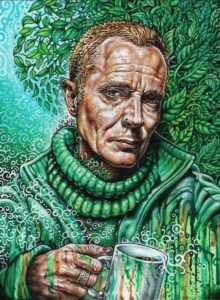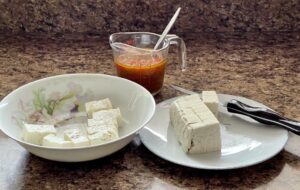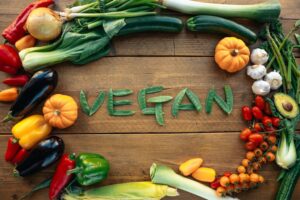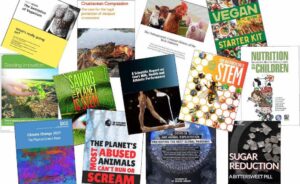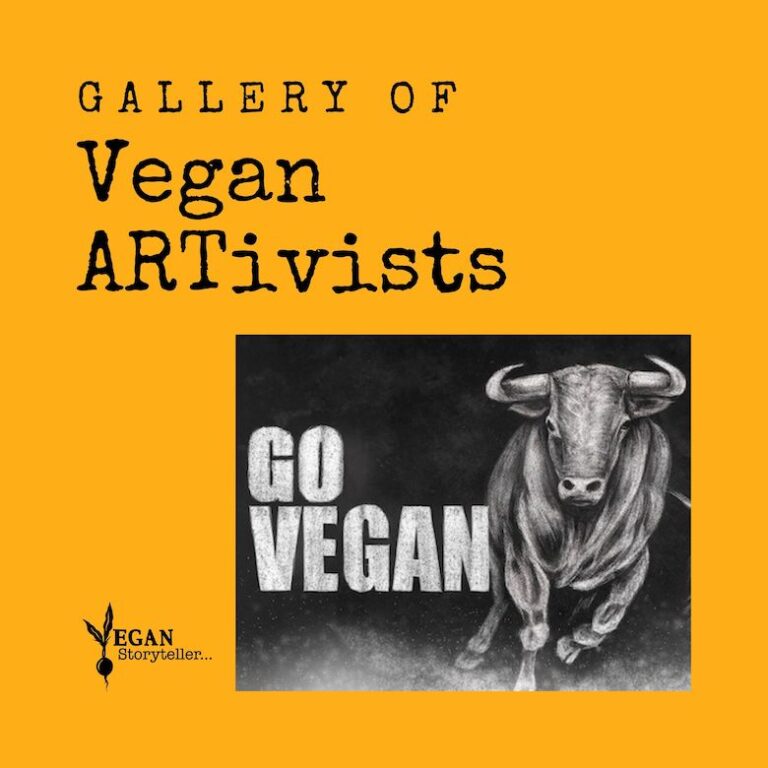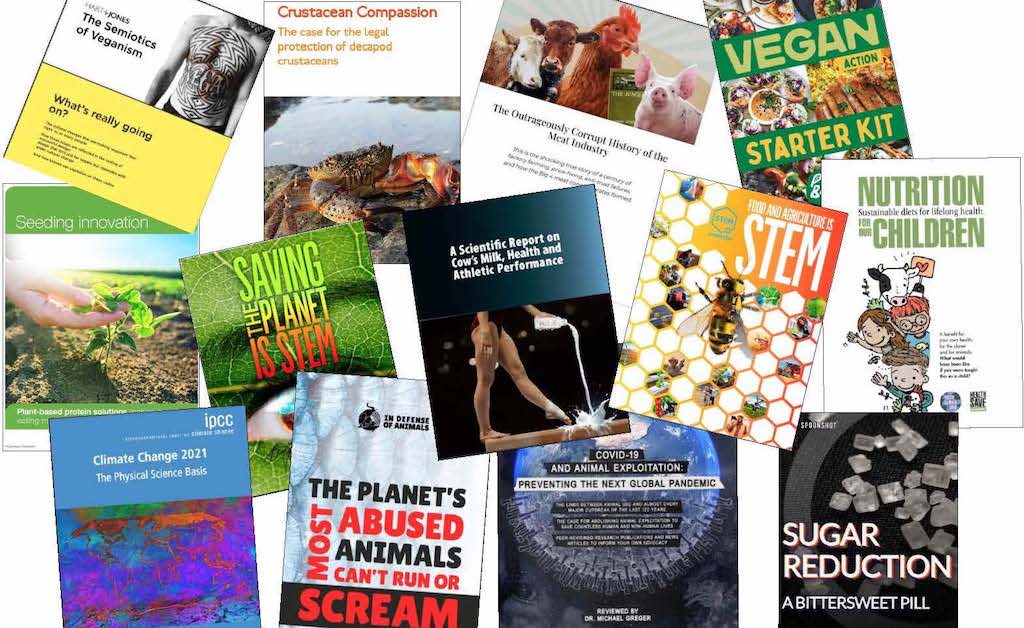Approximately one million Americans are vegan, according to the latest statistics. The public’s transition away from meat and dairy has been so rapid that The Economist declared 2019 ‘The Year of the Vegan.’
The popularity of veganism is on the rise and isn’t slowing down. Athletes, celebrities, health experts, and every-day people are going vegan for the animals, the environment, spirituality, and their health. Ciara Flack, a native of the Midwest, is one of them. Her mission is to dispel three staunch vegan stereotypes:
- vegans can’t have strong bodies
- veganism is unhealthy for children
- vegans are militant activists
To appreciate Ciara’s commitment to debunking these myths and stereotypes about veganism, we need to understand her vegan journey.
Most people don’t understand veganism. Rather than learn about it, they make assumptions based on stereotypes and myths. And then they mask their ignorance about it by taunting and demeaning vegans or blocking our path to the vegan lifestyle.
Ciara Flack Tweet
TABLE OF CONTENTS
Vegan stereotypes prevent Ciara from going vegan as a child
Succumbing to peer pressure out of loneliness
Awakening to who she is in a life-changing moment
Exploring the vegan journey alone
1. Break the vegan stereotype that vegans can’t be strong
Driven by passion and determination
Drawn to powerlifting
5 pillars of health
Overcoming negative self-talk
Not working out is not an option
Fitness program
Health organizations dispel vegan stereotypes
2. Lose the vegan stereotype that vegan children are unhealthy
Free yourself of the vegan stereotype that vegans can’t get enough protein
Dietary associations support vegan diets for children
Education is key to proper meal planning
Children naturally follow their parents’ example
Raising her sons vegan
Exposing children to videos about animal cruelty
Tips for parents
3. Get rid of the stereotype that vegans are militant activists
Letting her light shine to break down vegan stereotypes
Shaping a new vegan stereotype that has heart
Veganism amplifies the soul
Vegan stereotypes prevent Ciara from going vegan as a child
Ciara grew up in the tiny town of Foristell, Missouri, (population 500) about an hour west of St. Louis. Here, she faced the biggest challenge of her life — being roadblocked to following what she knew to be her destined path: the vegan lifestyle.
In the beginning, Ciara’s decision to become vegan was influenced by her love of animals. One day while surfing the web at home, she came across a PETA website that showed the brutality farm animals endure as they are raised and slaughtered for their meat.
The 11-year-old animal lover announced to her parents that she no longer wanted to eat meat after watching the video. Her plea fell on deaf ears. Her mother believed the vegan stereotypes that a plant-based diet was inadequate for a growing child in terms of protein, vitamins, and other nutrients.
Ciara found herself eating less and less because each time she sat down to eat, her mind would replay images of the graphic PETA video.
“I didn’t eat. And then I got so hungry that I couldn’t not eat anymore. My mom wouldn’t fix vegan food for me. Without her support, I had to eat what I was given. So, I ended up eating by desensitizing myself to the suffering of animals. In a sense, I had to disconnect from my soulful connection to animals and forget what I had seen in the PETA video,” Ciara said.
Throughout her childhood, Ciara struggled to establish a peaceful relationship with food. She determined to make her own sovereign choice to be vegan when she became an adult. The promise turned out to be difficult to keep.
Succumbing to peer pressure out of loneliness
Ciara’s childhood experience taught her important lessons about parents and vegan stereotypes. As a young woman in her early twenties, she learned that parents aren’t the only ones who are resistant to veganism.
“Most people don’t understand veganism. Rather than learn about it, they make assumptions based on stereotypes and myths. And then they mask their ignorance about it by taunting and demeaning vegans or blocking our path to the vegan lifestyle,” Ciara said.
Ciara felt isolated and alone. She was the manager of a medical clinic and couldn’t find peers who shared her spiritual beliefs about animals. Coworkers mocked her and made cruel remarks about her lifestyle, which left her feeling devalued.
“Between my parents’ vegan stereotypes, and then my coworkers’ vegan stereotypes, I genuinely felt like I had no place to belong,” Ciara said.
Feeling lonely and misunderstood, she gave in to peer pressure, just as she had once given in to her mother’s demands. In exchange for a sense of security and belonging, she abandoned her vegan ethic.
Two years ago, Ciara resolved to regain her power. She had denied her true self and the suffering of animals for too long. Her life had come to a crossroads, and she had to figure out which direction to take without being influenced by others.
Between my parents' vegan stereotypes, and then my coworkers' vegan stereotypes, I genuinely felt like I had no place to belong.
Ciara Flack Tweet
Awakening to who she is in a life-changing moment
Ciara’s life changed when a three-year-old French bulldog needed fostering. The young dog had whelped four or five litters and was in poor health due to the excessive forced breedings.
“I was on my way to meet the dog because a French bulldog was what I had always wanted. That was a top goal in my life at the time. I wanted a French bulldog,” Ciara said.
Before driving to retrieve the dog, she stopped to eat at the Chick-fil-A near her apartment.
“Here I am, eating fried chicken at Chick-fil-A,” Ciara said.
“I’m looking up at the sky and I think, wow, everything is just so vast and connected to everything else, and then I look down at my food and something clicks. I hear my mind saying, ‘Why are you so offended by this dog being bred when you’re not offended by chickens and cows being bred?’
“I instantly broke down and started crying. ‘I’m sorry, I kept sobbing, I’m sorry. I’m sorry.’”
“I was apologizing to the butchered chicken that was on my plate. I had a shift in consciousness at that moment in my life.
Ciara said she knew in her soul that she had to go vegan. Right then and there, she was done eating animals. At that moment, she stopped eating meat.
“My plate looked like death. It revolted me and made me feel disgusted with myself,” she said.
At 26, Ciara had finally gone vegan. It had been a long journey.
“I was apologizing to the butchered chicken that was on my plate. I had a shift in consciousness at that moment in my life.
Ciara Flack Tweet
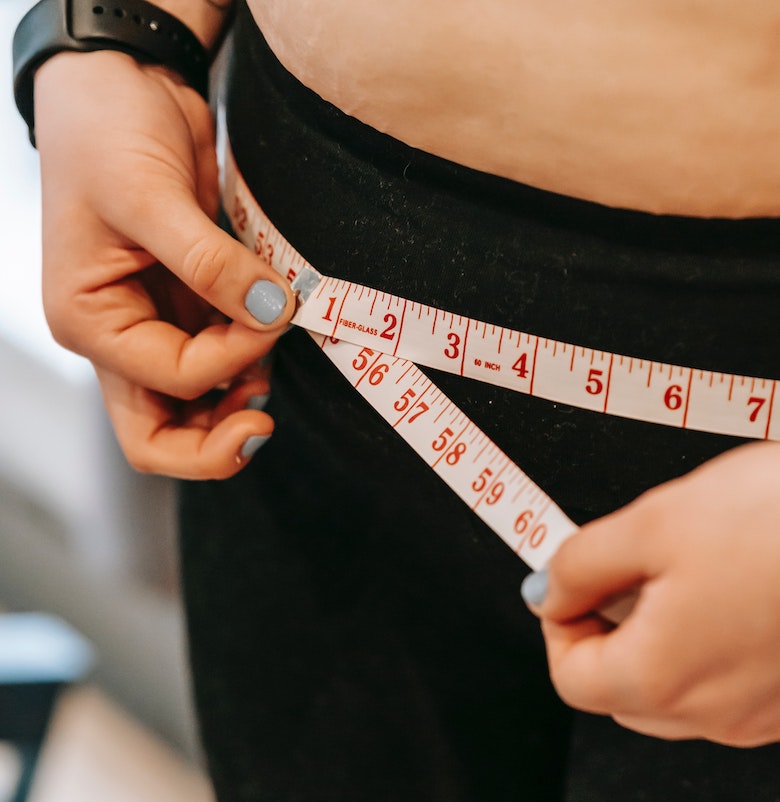
Photo by Andres Ayrton-Pexels
Exploring the vegan journey alone
Ciara is a pioneer by nature, so it is no surprise that, when she started on her vegan journey, she walked alone, without any mentor to guide her, not even a vegan starter kit.
As Ciara navigated the unfamiliar world of vegan nutrition, she began to gain weight. She learned that eating vegan foods didn’t always equate to eating healthfully.
There is a belief among many vegans that if a food is vegan, then it must be healthy. Just because something is vegan doesn’t mean it’s healthy. Ciara’s biggest lesson was that.
“I didn’t follow any protocol for going vegan, other than Pinterest recipes and my own intuition. I made a lot of mistakes by eating too many potatoes and other carbs and consuming processed and fried vegan foods,” Ciara said.
“Above all else, vegans should try to make conscious decisions to eat whole foods first. I am learning more about this every single day,” she said.
Today, Ciara is a 28-year-old mother of two young vegan sons, a student who is about to graduate with a Ph.D in metaphysics, a savvy business owner and entrepreneur, and a powerlifter who is on a mission to influence others about the values of veganism.
Her goal is to dispel myths about veganism and dismantle vegan stereotypes associated with them.
1. Break the vegan stereotype that vegans can’t be strong
Concerned about her weight gain, Ciara stepped on the scales the last day of 2020. As she looked down at her toes, she saw the number “208” staring back at her. In that moment, Ciara resolved that 2021 would be the year she got into the best shape of her life.
She decided to take part in a fitness challenge along with her partner Taio, who is also vegan and overweight. Ciara is determined to build her body strong to dispel vegan stereotypes and myths about what a vegan body can look like.
The fitness challenge she and Taio are competing in is not just for vegans. They are also up against omnivores.
“That fuels and motivates me even more to know that if I win, I will be doing something that many believed would not be possible to achieve as a vegan,” Ciara said.
Driven by passion and determination
A vegan product brand has a slogan that encourages people to embrace each day with passion and drive. With a personal passion for success and drive to excel, the company’s slogan could be Ciara’s personal mantra.
Ciara has documented her progress in weight loss and fitness since the beginning of the fitness challenge. From her first to her most recent photograph, she has lost 46 pounds, gained valuable nutrition knowledge, and improved her strength, speed, stamina, agility, flexibility, and mental control. YouTube has a time-lapse video of her 2021 fitness journey.
“I’ve learned that our own beliefs and fears are the only things limiting us,” Ciara said.

Photo by Taio Sweet-Starseed Family Productions
Drawn to powerlifting
Ciara’s desire to break down vegan stereotypes, as well as her desire to prove that a vegan body is powerful, has drawn her to powerlifting.
“I want to win the challenge to prove that vegans can lift heavy and not have to consume meat to do it. I know in my heart, mind, and soul, that this is possible. It just takes time. It all just takes time,” she said.
Besides breaking stereotypes about vegan bodies, Ciara said she just cares about her health and energy.
“That’s my big goal – to stay healthy and energetic the rest of my life,” she said.
Ciara monitors her macronutrient and micronutrient levels closely in order to achieve her goal. While strength training for the fitness challenge, she is careful to consume adequate macronutrients (protein, fat, carbohydrates) and micronutrients, such as Vitamin B12, Calcium, and Vitamin D.
5 pillars of health
The book Naturally DIETSTYLE, by Ruha Thevi, a guest blogger at Vegan Storyteller, taught Ciara about the importance of nutrients. The My Transformation app helped her stay on track.
Ciara gets 150 grams of protein a day from natural whole foods, pea protein powder, and a muscle recovery supplement called Ignition. Equally important, she drinks at least two gallons of fresh water a day. She learned in DIETSTYLE that healthy living includes whole vegan foods, water, sleep, exercise, and stress reduction in equal amounts.
“What I’ve learned with the five pillars of health that are written about in DIETSTYLE is that the more structured you are with yourself, the more likely you are to succeed. Once I decided to follow a sound practice, I stuck with it and followed through.
“I’m not saying it’s been the easiest thing to do, but it’s been worth it,” Ciara said.
“I want to prove that vegans can lift heavy and not have to consume meat to do it. I know in my heart, mind, and soul, that this is possible. It just takes time. It all just takes time.
Ciara Flack Tweet
Overcoming negative self-talk
Ciara’s early workout sessions were plagued by negative self-talk about her overweight body’s inadequacies. She often compared herself to the 14-15 year old version of herself who was an athlete.
“When I weighed over 200 pounds, I wasn’t comfortable in my body anymore. I didn’t want photographs to be taken of me. I was never like that before gaining weight, and I didn’t like that about myself,” she said.
Meditation and breath work helped her break up negative patterns. When she visualized the goals she wanted to achieve and how they would make her feel, she focused on the feeling she would have upon achieving them.
“Visualization is key. If I am feeling low, I grab my oracle cards and use them for positive support. I meditate every day, whether it is sitting in silence or following a guided meditation,” she said.
Negative self-talk also caused her to neglect eating because she felt other responsibilities had a higher priority. Over time, she came to terms with this unhealthy mindset and began to prioritize eating.
“I began to understand that without food as fuel, I would never be able to work out six days a week. I would never get strong. And without getting strong, I wouldn’t be able to fulfill my mission of breaking down the vegan stereotype that vegans can’t be strong,” she said.
Not working out is not an option
Ciara now feels more in control of her mind and body and can’t imagine life without working out. She doesn’t have to psyche herself up anymore to go to the gym on days when she doesn’t want to exercise.
“Society has made movement and physical activity out to be “optional.” However, if you really reflect on how you felt when you were younger and active versus living a more sedentary lifestyle, which way did you feel better? I look at my ability to move my body, in any capacity, as a privilege rather than a task. Not working out is not an option for me,” she said.
The vision of dispelling the vegan stereotype that vegans can’t be strong is the driving force behind Ciara’s fitness workouts. Every day she wakes up and decides that she is going to get stronger. She visualizes what it feels like to break down stereotypes and win fitness challenges.
She also visualizes asking her future self how it felt to win the fitness challenge, and how it felt to dismantle a staunch vegan stereotype. She practices these visualization techniques every day as she sculpts the powerful body she wants to present to the world.
“It is amazing what the human body can do with consistent work and effort,” she said.
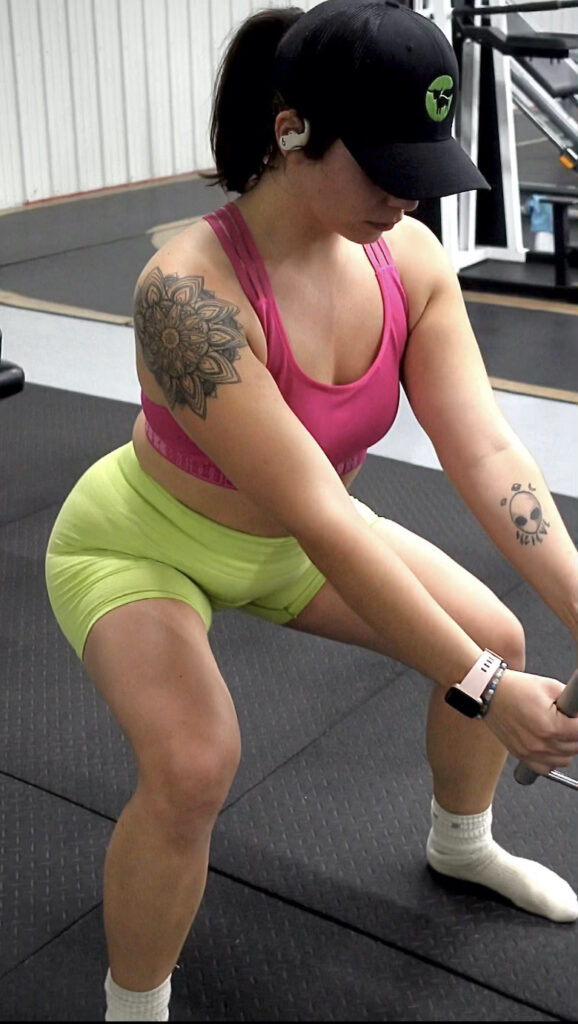
Photo by Taio Sweet-Starseed Family Productions
Fitness program
Q: Describe the training program you entered into, and how your training evolved over time to become increasingly advanced and challenging.
A: Strength training is what I enjoy most. It evolved as I learned more and more from those around me. Everyone has something to teach and I was very lucky to meet the right people at the right time on this journey.
I do resistance training, learning more in the form of CrossFit and powerlifting. Recently, I have added walking 45 minutes to my workouts, as one of my big goals is to go on a hike in every National Park in America at least once. I have found the more challenging the hike, the better the view. That’s honestly a huge motivator for me. While I am on the treadmill, I visualize that I am hiking somewhere beautiful.
Q: What does your workout routine look like?
A: My schedule looks like this:
M/W/F – glutes and legs
Tuesday – chest/triceps
Thursday – biceps and back
On some Saturdays I go into the gym and do a full body work out.
Recently, I have been waking up at 5 am, meditating, getting ready and going to the gym for about an hour and a half. I stretch when I get home for about 30 minutes and then continue with my day. I have found that waking up earlier has helped with time management. Personally, I am more productive in the morning.
Protein intake
Q: How much protein do consume each day?
A: I currently consume about 60 grams of protein from powder and the other 90 come from whole foods. I don’t plan to cut down on protein unless I want to lose muscle tone or go up in body fat.
During the challenge I was consuming 130-140 grams of protein; now I am consuming between 150-170. grams Many vegans will say consuming that much protein is wildly unnecessary. But my experience is that I have more energy and I recover better with higher levels of protein. I have lost over 10% body fat, and I feel good. I can only go with how I personally feel and the results I’ve seen.
Q: What percentage of your diet would you say is plant-based meat and vegan protein powder?
A: 40% powder, probably 40% whole foods and 20% plant-based meats. My main goal was to lose body fat; however, as I have progressed I have found that gaining muscle is just as exciting as losing body fat. Typically, I have been accomplishing my goals by just using equipment at the gym. I have a 10-pound kettle bell and my trainer, Tara, gave me a heavy resistance band.
Finding a gym and trainer
Q: How did you choose your gym and trainer?
A: Funny enough, Taio and I went into a gym in our neighborhood to see if they needed photographers for their business. They have a great rating and reputation in our small town. We ended up bartering our photographic services for gym memberships.
I have two coaches right now. Tara, at our gym, is writing my glute workouts. Elena, on the 1st phorm app is my other coach. Neither of them are vegan; however, one of my main goals is to influence athletes into seeing a vegan diet as sustainable.
For anyone reading this, please know that coaches are guides; they’re not with you 24/7. In fact, about 99.9% of any fitness program is going to depend on how much you personally want out of it. No one holds your hand. It’s just the harsh reality of it.
How do you manage your fitness routine and budget with everything else you are accomplishing?
Q: You are a business owner, Ph.D. candidate, and mother of two young sons. How do you manage a fitness program on top of everything else you do as?
A: I have done it almost completely by cutting out social media scrolling and television time. I believe that we prioritize what is important. Around three years ago I started paying attention to where my time was going, and it was unbelievable to see how much time I was wasting on mundane activities like watching television and scrolling on social media.
Q: How much would you say you have spent on your fitness plan since beginning?
A: My grocery bill has gone down and I didn’t start buying any supplements, vitamins or proteins until a few months ago. In that time, I have spent about $100-$150 extra a month. This is just an estimate.
Tracking fitness levels and nutritional intake
Q: How do you track your fitness levels and nutritional intake?
A. I use the 1st Phorm app that is $4.99 a month and has a personal coach. You can track your workouts and your nutrition and learn tons of fitness information. This company is not entirely vegan but for $4.99 it’s worth the investment. As for meditation, I just use Spotify and play “Frequency Music,” but anything that is calming would work great. The Deepak Chopra meditations are on Spotify for free, as well. Recently, I got a Fitbit and I believe that is also $4.99 a month, but there is a free version.
Q: What does your vegan meal plan look like?
A: Right now, I am eating VERY basic. Almost the “same thing” with different vegetables every day. It’s just easier to cook, easier to prep, and a huge time saver. I’ve really been loving avocado toast with pico de gallo, spinach, and tofu scrambled on top. There are so many ways to season tofu and avocados that you really can’t go wrong with those foods.
Q: What foods did you eat to lose weight?
A. I have been learning how to eat vegan for strength training through trial and error. No one helped me with this one. Unfortunately, there really wasn’t anyone to help me. So, I basically began eating foods that were low fat, high protein. In general, my meals are about 50-70% fruits and vegetables. I eliminated processed foods. Pizza and french fries were my favorite foods before I began the fitness challenge. Those foods were hard to let go of because of how “convenient” they are to get as a vegan.
Power foods
Q: What foods help you with peak performance?
A. Before the gym, I eat a banana. After the gym, I have a post-workout protein shake with Ignition, which is a glycogen replacement that helps with muscle recovery by spiking your insulin immediately after a workout. Mostly, I eat vegetables and tofu, to be honest.
Q: Do you have any advice on which foods to eat and why?
A. Edamame and broccoli are great sources of protein, and they are very filling. Potatoes and apples are great if you feel like you’re hungry all the time.
Q: What recipes and menus do you prepare for each of your meals?
A. It changes often. Also, it’s not so much recipes as it is “pick a protein, green, and carb” and season them to my liking.
Snacks and supplements
Q: What kind of snacks help you get through the challenging days when you seem to be hungry all the time?
A: I’ve never been a snack person. However, with this program, I eat six times a day. Two of those meals are protein meal replacements so it’s pretty rare that I actually get hungry unless I’m doing a new, more intense workout routine. That’s usually when I “up” my calories and protein. Fruit, if anything, will keep you slim and healthy long-term. Sometimes, I will get exotic fruit to break the pattern of plain apples and bananas.
Q: What supplements do you take?
A. Currently, I am using the Goddess for Fat Loss. However, I am new to this and I do not have an opinion formed on it yet. These supplements come with the Opti-Greens 50, which helps to get the nutrition that my regular diet may miss.
I take Vitamin D3 and a multivitamin, the post work out glycogen. That’s it, besides protein. My favorite vegan protein powder is Women’s Best Cookies and Cream.
Health organizations dispel vegan stereotypes
It’s no surprise to Ciara that plenty of research dispels the vegan stereotype that people need to eat animals to obtain proper levels of protein for a strong body.
Mainstream health organizations are recommending a plant-based diet for improved health. Included, among others, are Kaiser Permanente, the largest healthcare organization in the U.S.; the Dietary Guidelines Advisory Committee; and the American Institute for Cancer Research.
2. Lose the vegan stereotype that vegan children are unhealthy

Photo by Taio Sweet-Starseed Family Productions
Ciara still feels strongly about being denied the chance to go vegan as a child. She is raising her 9-year-old and 5-year-old sons vegan as a result.
She faced opposition to veganism as a child. As a parent raising vegan sons, she faces resistance or ignorance from others about the choices she has made for her children’s diet.
For Ciara, it’s time to lose the vegan stereotype that only bad parents raise their children vegan. Anytime she is challenged about how she is raising her sons, she engages in conversation to help educate people about nutrition guidelines for children.
Ciara is frustrated by people’s misconceptions, misinformation, and stereotypes about raising vegan children.
One percent of Americans are vegan, which generally means that veganism is something most people lack knowledge about. Yet, it is common practice for non-vegans to judge vegans. This is something Ciara finds particularly frustrating and annoying.
“In our culture, raising children vegan is a controversial act, as though you are a bad parent for doing so. According to vegan stereotypes, we are denying our children protein. There is a myth that we can’t get protein by eating plants. Most people know nothing about veganism, and they’ll judge a parent for raising her child vegan as if they are experts in the field,” Ciara said.
More parents are raising their children vegan as plant-based diets gain popularity. Research has shown that babies and young children on a vegan diet can get the energy and most of the nutrients they need to grow and develop from a well-planned varied and balanced diet.
According to a 2016 position paper from Academy of Nutrition and Dietetics, vegan diets can be nutritious and healthful for people of all ages, including children.
Most people know nothing about veganism, and they’ll judge a parent for raising her child vegan as if they are experts in the field.
Ciara Flack Tweet
Free yourself of the vegan stereotype that vegans can’t get enough protein.
Stephen Lauer, MD, is a pediatrician at the University of Kansas Health System. With his Ph.D. in biochemistry and extensive knowledge about veganism for children, he’s helping to break down common stereotypes about raising children vegan.
Lauer stated in a PubMED article that it has become increasingly common for parents to ask questions about health and safety aspects of a vegan diet for their children.
“My answer is that a carefully planned vegan diet can be a healthy diet with long-term benefits,” he reported.
Lauer goes on to note that there are several extra factors parents should consider when raising children as vegans. One of them is ensuring they get adequate micro-nutrients, such as B12 vitamins and iron for fuel in their bodies; calcium to strengthen bones, and omega 3 fatty acids to provide mental clarity through development.
For those following any diet, it is important to keep in mind both macronutrients and micronutrients. Macronutrients include protein, fat, and carbohydrates. Micronutrients are vitamins, trace minerals, and fatty acids that the body needs in smaller amounts.
Ciara makes it a priority to provide her sons with healthy food that meets their macro and micronutrient needs. She ensures that there is always something appropriate for them to eat in social settings and that their food choices are something they can talk about openly.
It's nice to give our children an education that will help them grow into loving and compassionate people. By not shielding them from animal cruelty, we allow them to fully understand what it means to make ethical consumer choices.
Ciara Flack Tweet
Dietary associations support vegan diets for children
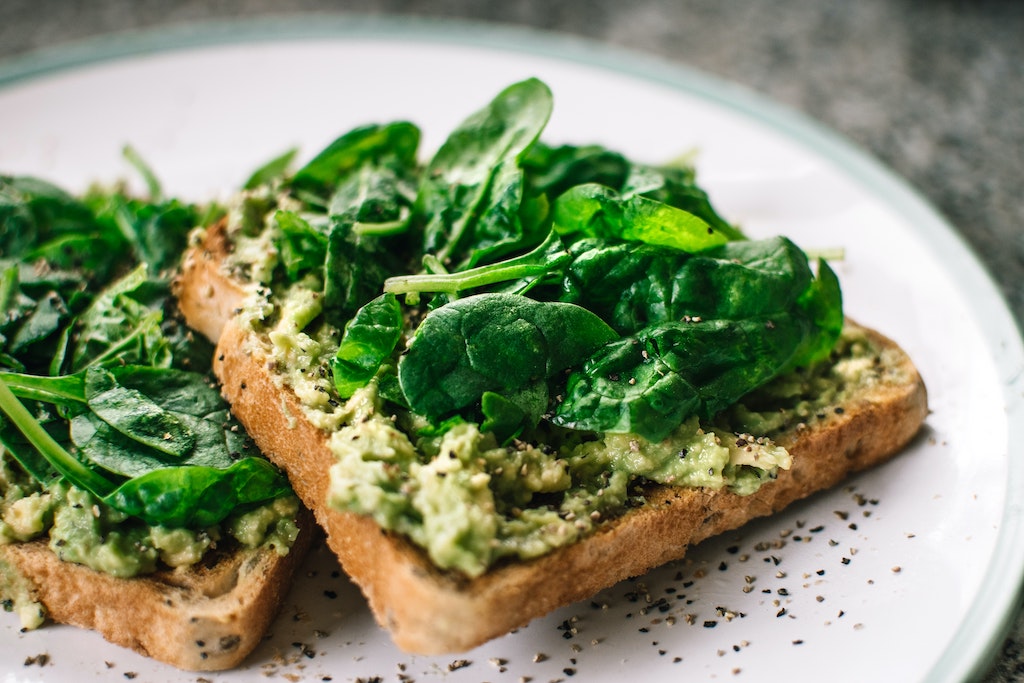
Photo by Lisa Fotios-Pexels
Well-balanced vegan diets can provide all of the nutrients that children need to grow into healthy adults. This is supported by Canada’s Food Guide, as well as American Dietetic Association and Dietitians Of Canada.
Children and adolescents grow up just fine on plant based diets if they’re provided with the right nutrients in their food sources, as evidenced by numerous well-designed studies.
An abstract on pubmed.gov titled “Nutrient status and growth in vegan children” and dated July 2021, indicates that vegan children showed normal growth and are less likely to be obese.
According to the American Academy of Nutrition, as well as other medical and dietetic societies, well-planned vegan diets are adequate for children of all ages. The published reports further dispel vegan stereotypes about raising children as vegans.
Nonetheless, a poorly planned vegan diet may negatively impact the health and growth of children and adolescents in the same way that a poor diet can affect adults.
Education is key to proper meal planning
Ciara is an informed parent. Medical assisting school taught her the basics of the body. Additionally, she reads nutrition books and medical articles and is well-informed about the nutritional needs of her sons. Medical studies and cautionary tales are familiar to her.
As a result, she is vigilant about planning her sons’ meals, making sure they consume fortified foods and drinks, and eat an appropriately planned vegan diet for their proper growth and development.
Ciara is realistic about meal planning for her family. With an increasing number of vegan products and fortified vegan foods available, she says it isn’t difficult for her to achieve her goal of providing her family with healthy meals.
To aid parents like Ciara who want to raise their children vegan, PubMED has published an article titled “Developing a Food Exchange System for Meal Planning in Vegan Children and Adolescents.” (PubMED was developed and is maintained by the National Center for Biotechnology Information, at the U.S. National Library of Medicine, located at the National Institutes of Health.)
In the January 2019 article, caregivers are given tools to help facilitate vegan meal planning for children and adolescents. The article describes a system to meal planning that is based on food exchanges.
The article includes plant-based food exchanges at macro (protein, carbohydrates, fats) and micro levels (vitamins, minerals, fatty acids) to assist in planning healthy, balanced vegan diets for children and adolescents.
Children naturally follow their parents’ example
Ciara believes that parents wishing to switch to veganism need not worry about their children’s diet since children will naturally follow their parent’s example.
“That’s something to live by,” Ciara said. “My boys eat well because Taio and I make well-planned vegan meals,” she said.
Raising her sons vegan
Q: Is there a concrete example in your children’s lives to dispel the vegan stereotype that veganism is unhealthy for children?
A. We don’t supplement our children’s diet with B-12. Interestingly enough, our pediatrician was fine with this decision for two years. In 2021, the boys’ doctor adopted a new policy and insisted on drawing blood from them to test their B12 counts. Both boys bloodwork came back perfect. They have normal blood panels across the board. That speaks for itself about a vegan diet for children.
Q: How do you handle it when the boys want to eat something that’s non-vegan?
A: Whenever we’re at social gatherings and they want to try something that isn’t vegan, I’ll tell them what’s in it: egg, milk, butter. Nine times out of 10, the boys will not eat it if it came from an animal. They understand that non-vegan food contributes to the suffering and pain of animals.
Still, sometimes Archer will see something he wants, like cake. I’ll tell him there’s dairy in that cake, and he’ll be like, “I don’t care, it’s cake. ” You know, because he’s only five. But most of the time he isn’t tempted by non-vegan food.
My sons eat tofu, salad, grains, seeds, nuts, and fruits and vegetables. They are open to trying new vegan foods. But when they do resist a vegetable, I have found that the best way to get them to eat more greens is not to force them to eat greens. They eat them in their own time.
Exposing children to videos about animal cruelty
Q: What are the ways that your sons have made connections between animals and food and how have they become so sensitive to animal suffering?
A: “I’m not going to lie. Both of my boys have watched animal cruelty videos. They are very aware of how food is produced, what it means to be vegan, and what it means to be non-vegan.
Jayden, my nine-year-old son, retains facts about animals like nothing I’ve ever known before. I don’t know if he will end up a biologist or what he will do with his life as an adult, but he has a real, genuine passion and deep compassion for animals. Most children have a strong connection with animals. They don’t comprehend what animals go through to become the meat on your plate or the milk in your glass.
It’s nice to give our children an education that will help them grow into loving and compassionate people. By not shielding them from animal cruelty, we allow them to fully understand what it means to make ethical consumer choices.
Q: What about school? How do you ensure the boys are eating vegan in the school cafeteria?
A: I homeschool Archer, so school food is not a problem for him. In Jayden’s case, he packs his vegan school lunch the night before and prepares a healthy breakfast for himself every morning.
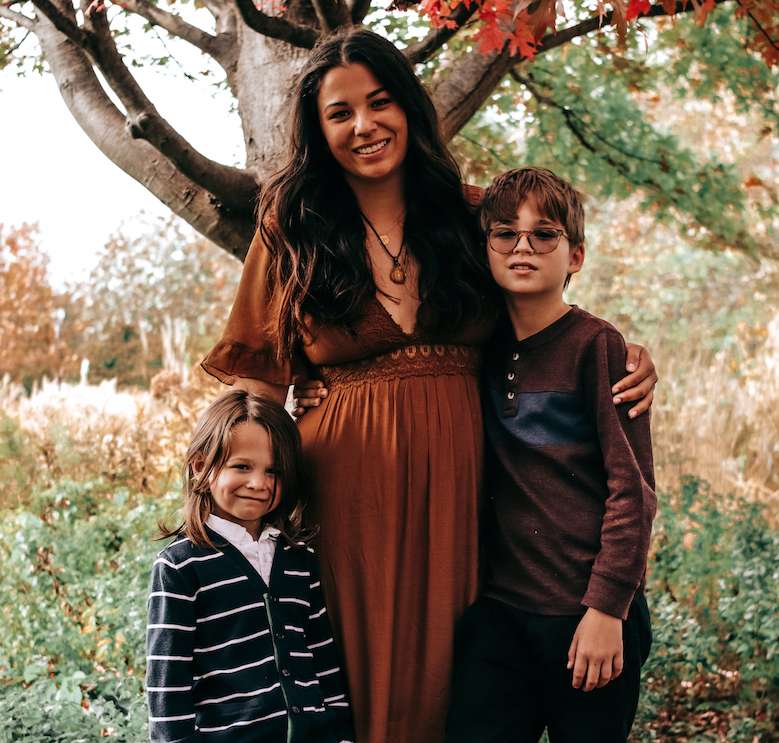
Photo by Taio Sweet-Starseed Family Productions
Tips for parents
Q: What kind of healthy food swaps have you discovered?
A: Dave’s Killer Bread over regular whole wheat. It has more protein and more grains. Zucchini noodles instead of spaghetti noodles. My beloved french fries are now air fried with no oil, or with light oil and light salt.
Q: Do you have any tips for other parents who want to prepare vegan meals for their children?
A: Take a day out of the week and map out everything. Shop your pantry first. Calculate how much you need to purchase of everything and buy it all in one day. Buy meal prep containers to put everything in. This way, you won’t be unprepared and make potentially bad choices.
Healthline offers other tips for parents wanting to raise their child vegan. https://www.healthline.com/health/baby/vegan-baby#deficiency-risks
3. Get rid of the stereotype that vegans are militant activists
Many non-vegans perceive vegans as militant activists who prioritize the lives of animals over humans. While some vegans are activists and militants, many are not. The same holds true for non-vegans — some promote, campaign, and advocate for hunting and other forms of killing animals for meat, sport, and fashion, while others do not.
Vegans make their own choices in life based on their beliefs about animal welfare, the environment, health, and/or spirituality. Individual opposition to meat and dairy does not necessarily translate into taking to the streets with graphic images of suffering animals. Vegans, like any subset of people, are multi-dimensional and do not fit into a cookie-cutter mold.
Ciara’s form of activism is living a genuinely ethical vegan lifestyle. She believes the best way to affect change is staying true to her beliefs and leading by example with integrity, courage, and tenacity so that others identify with her authenticity and are drawn to it. Observing a vegan’s everyday actions can demystify veganism, debunk vegan stereotypes, and help others see how they can adopt that lifestyle as well.
Letting her light shine to break down vegan stereotypes
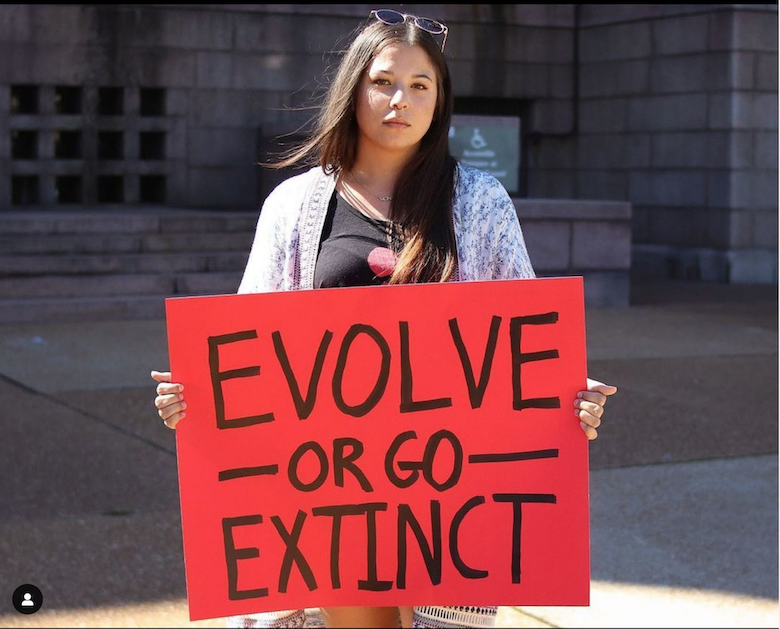
Photo by Taio Sweet-Starseed Family Productions
Ciara does not believe that activism in the stereotypical sense is the norm for vegans. In her view, most vegans choose to live a quiet vegan lifestyle and let their light shine as a form of activism. Nevertheless, Ciara appreciates the value in being with others who share her compassion for animals.
“I will say that when I participated in a street action with vegan activists, it was the first time in a really long time that I didn’t feel so alone. I have always felt an actual dissociation with society because of people’s attitudes towards animals. Many people have an attitude toward animals that is cruel and abusive; otherwise, they wouldn’t eat them or wear their fur,” she said.
“In the protest campaign I joined, I was with people for the first time who understood me. They felt the same way about animals that I feel. It was really nice to have a human connection on that level,” she said.
When our bodies, minds, and souls are embodied as one, we are unable to consume meat, dairy products, or anything else containing negative energy from the suffering of animals. If you have a high enough energy vibration, you are not going to want to put into your body, or onto it, anything that has lived in a suffering state.
Ciara Flack Tweet
Shaping a new vegan stereotype that has heart
Ciara brings a courageous heart to the vegan movement. She has begun designing a course to help people who truly want to be vegan, but do not believe they can make the switch. She wants to demonstrate, as part of the course, that the spiritual and healing techniques she used for herself when she went vegan can help others.
“When our bodies, minds, and souls are embodied as one, we are unable to consume meat, dairy products, or anything else containing negative energy from the suffering of animals. If you have a high enough energy vibration, you are not going to want to put into your body, or onto it, anything that has lived in a suffering state,” Ciara said.
Some people express anguish, shame, guilt, and regret in their complicity in harming animals as omnivores after turning vegan. Through her work, Ciara wants to transform the way people think so that negative thoughts are replaced by positive ones.
She wants to help people renew relationships with themselves and to connect them with the all-knowing universal consciousness within them so they can rise above trauma and other challenges and unblock their grief, forgive themselves, and glow with peace and joy. Her course will help people reconnect with themselves and their source of a higher power so they may live a better life.
Veganism amplifies the soul
For Ciara, it’s vital to integrate mind, body, and soul as a spiritual approach to veganism.
“I don’t think I would be on this level of connection with my own self if I had not gone vegan,” she said.
“Veganism has connected me to intuition and everything within and outside of my body. Being vegan has amplified my soul,” Ciara said.
As Ciara dismantles outdated vegan stereotypes, she is replacing them with new and relevant beliefs. It is Ciara’s hope that others will accept the spiritual approach to activism as being more common among vegans than militant activism.
If anybody is going to stereotype vegans, a stereotype about strong, spiritual vegans with good parenting is the right one.
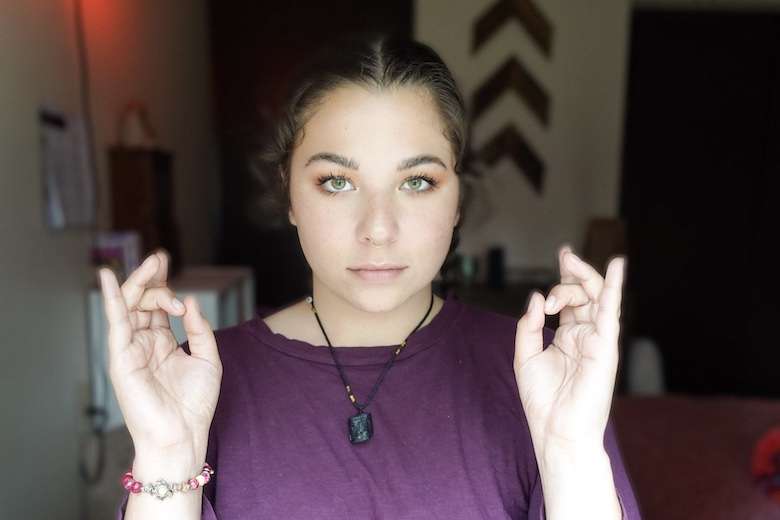
“Veganism has connected me to intuition and everything within and outside of my body. Being vegan has amplified my soul.
Ciara Flack Tweet
Follow Ciara Flack
Your body is meant to be healthy. It knows the ideal health conditions it should be in and is always striving to stay in good working condition. When we say that health is in your nature, we mean it. Literally.

Read next Health is in your nature

